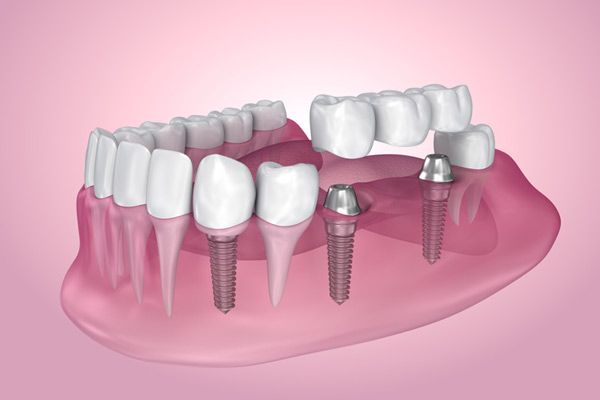How Long Do Dental Implants Last?
West Linn, OR
 Dental implants are a cornerstone of modern dentistry, representing a significant advancement in dental care and offering a long-term or permanent solution for missing teeth. Unlike dentures or dental bridges, dental implants offer a stable and durable option, closely mimicking the natural tooth. Dental implants are a cornerstone of modern dentistry, representing a significant advancement in dental care and offering a long-term or permanent solution for missing teeth. Unlike dentures or dental bridges, dental implants offer a stable and durable option, closely mimicking the natural tooth.
Understanding Dental Implants
Dental implants are composed of titanium posts that are inserted into the jawbone, where they serve as a substitute for the root of a missing tooth. On top of this post, a meticulously crafted replacement tooth or bridge is securely mounted. Titanium is used for its exceptional strength, durability, and ability to fuse with bone over time, a process known as osseointegration. This makes the implant stable and allows it to last many years, potentially a lifetime, with proper care and maintenance.
Types of Dental Implants
When considering dental implants, understanding the distinction between single-tooth implants and multiple-tooth implants is crucial. Each type caters to different needs, depending on the number of teeth missing and the patient's oral health condition. Here are the specifics of these two options:
Single Tooth Implants
Single-tooth implants are designed to replace a missing tooth without affecting the neighboring teeth. This type of implant consists of three parts: the implant itself, which serves as a new root; a custom-made crown that matches the natural teeth; and an abutment that connects the crown to the implant.
It is important to note that the actual procedure for a single tooth implant involves inserting it into the jawbone, allowing it to integrate with the bone through osseointegration.
Once the implant has fully bonded with the bone, the abutment is placed on top of the implant, and then the crown is carefully attached. Single-tooth implants are highly valued for their ability to provide a solution that closely mimics a natural tooth in terms of both tooth appearance and function.
Multiple Tooth Implants
Multiple tooth implants, also known as implant-supported bridges, are used when more than one tooth of the patient is missing. Instead of using a dental bridge supported by natural teeth, which requires altering these teeth, multiple tooth implants use several implants as the support structure.
This method preserves the integrity of surrounding natural teeth and provides a stable foundation for the dental bridge. The process involves surgically placing two or more titanium implants directly in the gaps of missing teeth, allowing ample time to integrate securely with the jawbone.
Once healed, a custom-made bridge is securely attached to these implants, filling the space with artificial teeth that look and function like natural ones. Multiple tooth implants are an excellent option for restoring a larger span of missing teeth, offering both aesthetic and functional benefits.
Both single and multiple-tooth implants offer a durable, long-lasting solution for tooth loss, significantly improving a patient's quality of life. They maintain facial structure, prevent bone loss, and allow for normal eating and speaking. Choosing between single-tooth implants and multiple-tooth implants depends on the specific needs and goals of the patient. Consultation with our dental professionals at Roane Family Dental is essential to determine the most appropriate option.
Lifespan of Dental Implants
The lifespan of dental implants can vary, influenced by many factors, including the patient's oral hygiene, lifestyle, and the quality of the surgery. Generally, dental implants are expected to last:
| • |
Single Tooth Implants: Over 95% survive for 10 years or more
|
| • |
Multiple tooth implants: Similar survival rates as single tooth implants
|
| • |
Overall longevity: With proper care, can last a lifetime |
Factors Affecting Dental Implant Longevity
Several factors can influence how long dental implants last. Some of these include:
Oral Hygiene
Maintaining excellent oral hygiene is paramount for the longevity of dental implants. Regular brushing, at least twice a day, and flossing, at least once daily, are essential to prevent plaque and bacteria buildup that can lead to infections around the implant site. Additionally, scheduling regular dental check-ups allows for professional cleaning and monitoring of the implant's condition. Adhering to these practices ensures the implant and surrounding tissues remain completely healthy.
Lifestyle Choices
Certain lifestyle choices, notably smoking and uncontrolled diabetes, can greatly diminish the durability and success rate of dental implants. Smoking restricts blood flow to the gums, hindering the healing process and potentially leading to implant failure. Similarly, poorly controlled diabetes can affect gum health and delay healing, increasing the risk of infection around the implant site. Patients must manage these conditions and adopt a healthy lifestyle to ensure longevity.
Location in the Mouth
The position of dental implants within the mouth significantly affects their wear and longevity. Implants placed in the back of the mouth endure more force and pressure due to chewing, which can accelerate wear and increase the risk of complications. These implants often require more careful monitoring and may have a slightly reduced lifespan compared to implants in the front of the mouth. Understanding this can help patients and dentists plan for and manage long-term implant care.
Quality of Procedure
The success and longevity of dental implants are highly dependent on the skill and experience of the dental professional performing the procedure. Choosing a qualified dentist or oral surgeon, like Dr. Matt Roane, who uses advanced techniques and materials, can significantly improve the outcome. The precision of implant placement, the quality of the implant material, and the thoroughness of the evaluation all contribute to the implant's success.
Maintenance of Dental Implants
Maintaining dental implants is similar to caring for natural teeth:
| • |
Brushing twice a day
|
| • |
Flossing daily
|
| • |
Regular dental check-ups with Dr. Matt Roane
|
| • |
Avoiding hard foods that could damage the implant
|
| • |
Using a soft-bristled toothbrush and non-abrasive toothpaste
|
| • |
Avoiding smoking to promote better healing and longevity
|
| • |
Limiting sugary foods and drinks that can lead to decay and gum disease
|
| • |
Wearing a mouth guard if you grind your teeth at night
|
| • |
Rinsing with an antimicrobial mouthwash recommended by your dentist |
Schedule Your Consultation Today
Dental implants offer a permanent solution for missing teeth and, with proper care, can last a lifetime. The success of dental implants is highly dependent on the patient's commitment to good oral hygiene, lifestyle choices, and regular dental visits to Roane Family Dental. To schedule your appointment or learn more about dental implants, call us today at (503) 657-1215. |
